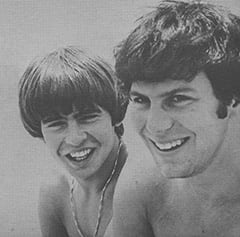
If you ever see a “mystery man” following Saj or Davy, chances are he’s not about to harm them but to protect them against the “lunatic fringe” who waylay the stars.
The dressing-room door is kicked open. A young, good-looking guy with curly blond hair walks in. He looks carefully under all the furniture and into all the closets. Then he turns and says to the other man, “It’s O.K. You can bring him in.” And Sajid Khan is escorted into the room.
The blond boy is 22-year-old Nolan Ripley of Memphis, Tennessee (Sajid’s road manager), and the other man is Floyd Ackerman (Sajid’s personal manager). They have just acted out a vignette which is fast becoming a part of their—and Sajid’s—everyday life: a careful inspection of all premises where Sajid must be before Sajid himself enters. At first glance, the ritual has a sort of “cloak and dagger” air about it, but—when the facts are known—it will soon be apparent that these are very necessary precautions not only to protect the well-being, health (and, yes—even the life) of Sajid, but that they are also necessary precautions for the protection of all performers.
He’s never left alone Permalink
Before Sajid’s rapid rise to stardom, he enjoyed such luxuries as going for a walk by himself, shopping by himself, stopping for a snack or even visiting neighborhood friends all on his own. But those days are gone forever for Sajid.
“It’s been a very difficult adjustment for me to make,” Sajid admits. “I’ve always treasured my private moments. I feel that it is very important for a man to be alone once in awhile. Now, the only time I’m really alone is when I go to my room at night to sleep. In the house in Beverly Hills, where I live with my American ‘family’, there is a great feeling of security. Everyone on my block (and that includes Lucille Ball and her children Desi and Lucie) knows that we have our own private police force in our neighborhood in Beverly Hills.
“There literally is a guy who sort of unobtrusively hangs around. It’s probably more than one guy, but he seems like a kind of ‘mystery man’ you never know—but you know he’s always there. He is our private policeman. He not only knows all the parents on the block and their children—but he knows our friends too.”
The “mystery man” strikes Permalink
Hollywood has long been used to open and veiled threats not only against the established stars (and often against their children), but also against the very promising, upcoming young stars. It seems that every community has a “lunatic fringe”—a kind of person who will do anything from outright kidnapping to just trying to steal a piece of clothing or a personal possession that a star has actually used or touched. Because the bodyguards and private policemen cannot always be sure exactly what such persons intend to do, they have a general iron-clad rule to hustle any stranger or suspiciously acting person out of the neighborhood and on his way—pronto!
When Sajid’s work calls him to television studios or out of town, where he will use motels, backstage dressing-rooms, etc.—it is Nolan who accompanies him with the somewhat misleading title of road manager. Nolan’s real job is to see that Sajid gets where he is supposed to go, gets there on time, gets there safely, and is never left alone. In a single moment when a star is left alone there are a million chances that anything could happen. It might be something as innocent as an over-enthusiastic fan dashing into the room and grabbing a handful of hair or the sleeve off the star’s shirt. Or it might be something as serious as a jealous guy (whose girl has flipped over Sajid, let’s say) intent on doing as much physical damage as he can.
Best friend-bodyguard Permalink

Because of the endless possibilities of harm (either intended or innocent) befalling a star, sooner or later all of them are forced to employ some kind of protection. In Davy Jones’ case, his bodyguard is his best friend David Pearl. If you met David Pearl, with his easygoing manner and slow Texas accent, you’d probably take him for the last person in the world who could protect volatile, impetuous Davy Jones. How wrong you would be! Although he is quiet, David Pearl has a black belt in karate (that’s the highest rank you can achieve in the Japanese fine art of self-defense) and to borrow a line from good old Superman-David is “…faster than a speeding bullet and more powerful than a locomotive!” Fortunately, David has never had to use his strength to do more than just hold back a crowd of fans so that Davy could get through. But if the occasion ever arises, David will be there—and whoever is on the receiving end will be better off running like greased lightning!
When the Monkees are traveling on a concert tour in America or abroad, their security precautions are probably the most elaborate ever taken. When they are booked into a hotel, the entire floor is booked for them and the entrance and exits are sealed off—twelve hours before the Monkees arrive. The elevator operators are shown photographs of the Monkees and their entourage and are instructed to deliver no one—but no one—else to their floor. Security guards are not only placed at every door on the Monkee floor, but they are also placed on the floor above and the floor below. Each person in the Monkee party is given a small, specially designed “police” badge which identifies him as being part of the group. This badge is the only means for getting backstage later. Even the Monkees themselves have to have one! Aside from the above-mentioned security guards, each Monkee has a private bodyguard—usually a close friend, as in Davy Jones’ case. If one of the Monkees decides that he wants to go out to dinner or down to the coffee shop, he is always accompanied by no less than two bodyguards.
No place is sacred! Permalink
Davy’s home is another spot he has been forced to protect. For instance, awhile back, two fans, innocently looking for souvenirs, accidentally released the brake on one of his cars—causing it to roll out into the street.
“Anything could have happened,” Davy recalls. “Another car could have come around the corner, hit my car—and someone could have been killed! Or worse yet, suppose one of those little girls, who were just looking for souvenirs, had accidentally fallen and the car had run over her!”
Davy shudders at such thoughts. Ultimately, he had to put a huge wire fence around his home to protect himself and also to protect those who try to “break in” looking for Davy Jones’ mementos.
“The things I hate most of all,” Davy says, “are anonymous telephone calls. I know one thing—it’s never a friend of mine who makes a call like that. The voices vary—sometimes they’re young, sometimes old, sometimes it’s a girl, sometimes a guy. But when you get an anonymous phone call, you never know for sure whether it’s a joke or some madman trying to find out if you are home so he can—” Davy never finishes that sentence.
One night Davy got several such calls. A girl’s voice said, “I’m coming over there to get you right now!” And she hung up. Davy, unsure whether this was a compliment or a threat, hesitated for a moment and then called the Hollywood police.
“It was unbelievable,” Davy recalls, wide-eyed. “It seemed like only a few seconds later the whole place was crawling with police! Some were in uniform and some were plainclothesmen. They searched the grounds and then some of them left, but several plainclothesmen and several cops stayed ostentatiously around the grounds—just in case whoever made the call drove by to decide whether or not to carry out her threat.
“Ever since that night, I’ve noticed that I sometimes see this mysterious figure in the neighborhood. He looks like a guy who is about 30 or so, and he moves quickly and silently. Actually, sometimes I haven’t been sure whether I saw him or not. I inquired later and found out who he really is. It seems that the police, on learning who I was, decided to assign a rotating plainclothesman to my neighborhood—just in case. It’s kind of funny to know that you have your own private ‘mystery man’ following you about, but though it’s mighty strange—it certainly is a comfort!”

